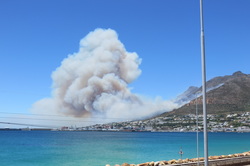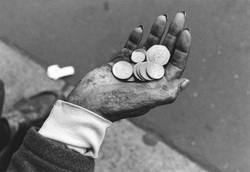
After the devastating fires in Simon's Town in November, our community is still coming to terms with what happened. Unfortunately, the fire season seems to be only just beginning, with many small fires popping up everywhere, which means we need to be ever vigilant.
ARE YOU PREPARED?
You all have heard stories of, and many of us will have seen, how quickly a fire can overwhelm a property; how little time you have to evacuate. So, although this article in no way claims to be a go to plan, it may get you thinking about an evacuation plan for your family and how to prepare your property!
Have you ever thought about what you would do and/or take if you had 5 or less minutes to leave your home?
A lot of this information can be found on the internet, especially on website in Australia and the United States. Here are a couple of suggestion, tips and hints you might like to think about and perhaps instigate in your home.
PREPARE YOUR EVACUATION KIT
Embers from a fire can cause fires to ignite far ahead of the actual fire. So, even if a fire is far away, you may still need to be prepared to leave your property. Here are few things you might like to think about!
PREPARE YOUR PROPERTY
If you are an urban resident there is a responsibility to manage the risk of a fire on your property, and the risk of it impacting on neighbouring properties. It is always a good idea to prepare your property by doing the following:
BE INFORMED
On hot, dry, windy days you should pay extra attention to the fire risk in your area. There are actions you can do to save time in case a fire does start:
PREPARE YOUR PETS AND LIVESTOCK
A fire will be a traumatic and stressful experience for your pets and livestock. During a wildfire your animals will need water, shade and a safe place. You should always contain your animals in a well cleared fenced-in area. Never turn animals out on the road to run free. This is dangerous not only for them but also for firefighters and other people on the road.
BEFORE THE FIRE IMPACTS... YOU NEED TO BE ACTIVELY DEFENDING YOUR PROPERTY
As said earlier in this article, the tips and hints are only suggestions on what you can do to be safe in the event a wildfire happens in your area. Please do join your Neighbourhood Watch, because forming a community makes communities strong.
ARE YOU PREPARED?
You all have heard stories of, and many of us will have seen, how quickly a fire can overwhelm a property; how little time you have to evacuate. So, although this article in no way claims to be a go to plan, it may get you thinking about an evacuation plan for your family and how to prepare your property!
Have you ever thought about what you would do and/or take if you had 5 or less minutes to leave your home?
A lot of this information can be found on the internet, especially on website in Australia and the United States. Here are a couple of suggestion, tips and hints you might like to think about and perhaps instigate in your home.
PREPARE YOUR EVACUATION KIT
Embers from a fire can cause fires to ignite far ahead of the actual fire. So, even if a fire is far away, you may still need to be prepared to leave your property. Here are few things you might like to think about!
- Your pets and any other animals require proper care and attentions during fires. So consider food, medication, transportation and sleep arrangements for your animals should you need to leave your home.
- Prepare an Evacuation Kit and make sure that every member of your family knows where it is. You might like to have the following in your Kit:
- Protective clothing for your whole family (long sleeved cotton shirts and trousers, i.e. jeans, sturdy boots or shoes)
- Battery operated with spare batteries or wind-up radio
- Safety goggles, protective gloves and a wide brimmed leather hat
- Combination pocket knife
- Mobile phone and a battery charger
- Waterproof torch with spare batteries
- Candles with waterproof matches
- A box with your family's medication, toiletries and sanitary supplies
- Your wallet or purse and money/ATM cards
- Your valuables: ID books, passports, photographs, legal papers such as wills, marriage certificate and/or divorce papers, insurance papers, jewellery
- A medical aid kit and a list of contact information
- Water (3 litres of water per person per day and don't forget to include water for your pets)
PREPARE YOUR PROPERTY
If you are an urban resident there is a responsibility to manage the risk of a fire on your property, and the risk of it impacting on neighbouring properties. It is always a good idea to prepare your property by doing the following:
- Replace any missing or damaged roof tiles
- Keep lawns short and gardens well maintained
- Cut back trees and shrubs overhanging buildings
- Clean up dry and fallen leaves, twigs and debris around your property
- Have hoses long enough to reach round your house
- Check that your insurance is up to date and adequate
- Prepare gutter plugs (socks filled with soil/s)
- Fit seals around doors and windows to eliminate gaps
- Repair or cover gaps in external walls and fences
BE INFORMED
On hot, dry, windy days you should pay extra attention to the fire risk in your area. There are actions you can do to save time in case a fire does start:
- Contain pets so they can be easily found
- If you have livestock, move to fully grazed areas
- If you have water pumps and generators, check they are working
- Review your Wildfire Evacuation Plan with your family and have your Emergency Survival Kit and protective clothing ready
- Listen to the media and any Neighbourhood WhatsApp Groups for updates and information
- Talk to your neighbours, family and friends
PREPARE YOUR PETS AND LIVESTOCK
A fire will be a traumatic and stressful experience for your pets and livestock. During a wildfire your animals will need water, shade and a safe place. You should always contain your animals in a well cleared fenced-in area. Never turn animals out on the road to run free. This is dangerous not only for them but also for firefighters and other people on the road.
BEFORE THE FIRE IMPACTS... YOU NEED TO BE ACTIVELY DEFENDING YOUR PROPERTY
- Ensure you drink plenty of water so you do not dehydrate.
- Block your down pipes, (a sock full of sand/soil will help) and fill your gutters with water.
- Move flammable items such as outdoor furniture, doormats, hanging baskets away from the house.
- Gas cylinders should have the valve facing away from the house.
- Do not stand on your roof with your hose. In wildfires, often more people are injured by falling from roofs than suffering burns.
- Patrol the outside of your home, putting out any embers and spot fires that may start. An ember or spark can reach your home hours before the fire front arrives.
- Just before the fire arrives, wet down timber decks and gardens close to the house.
- Move any firefighting equipment to a place that it will not get burnt.
As said earlier in this article, the tips and hints are only suggestions on what you can do to be safe in the event a wildfire happens in your area. Please do join your Neighbourhood Watch, because forming a community makes communities strong.




 RSS Feed
RSS Feed
